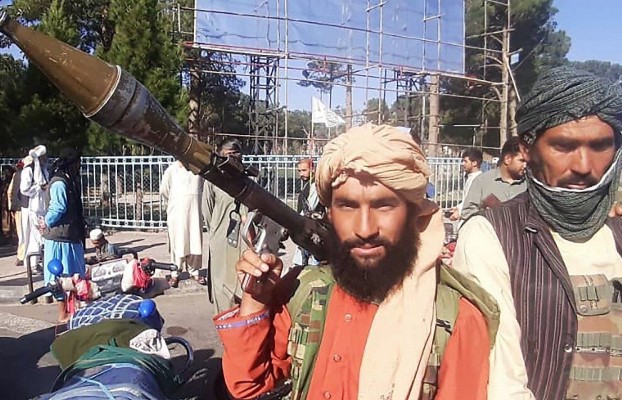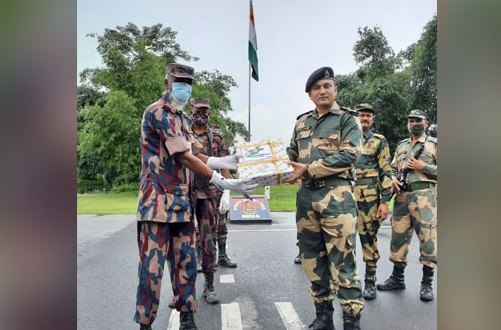Buzkashi, the national game of the people of Afghanistan, has horsemen competing to possess the headless body of a goat. In one of the world’s most enduring ironies, the country has itself become the goat, being dragged and tossed around. A horrified world watches as an elected government is losing out to the Taliban, a group of women-hating men poised to take control.
They have rendered impotent and helpless the outsiders, all powerful, that have been either backing them diplomatically and militarily, or opposing them meekly, with wordy resolutions.
It happened to the British and the Russians and now, it is the Americans. The unprecedented turn of events has yet again shown that Afghanistan cannot be controlled from outside. Even before the United States ends its longest war by this month-end, the Taliban are knocking at the gates of Kabul, poised to win this round of what has been gamely called the “Great Game”.
The Game’s original players, erstwhile imperial powers Britain and Russia, now pale shadows of themselves, are riding piggy-back on the United States and China respectively. As the US departs, yet dominates the global discourse, the ascending player is China. Sadly, the global line-up the two lead, guarantees more violence and bloodshed for the Afghan people.
This round unfolds without a political solution that the US naively sought, signing a deeply flawed Doha Agreement of February 2020. It gave the Taliban primacy and legitimacy, without securing an end to the conflict and certainly, to terrorism. Now, since everybody is talking, the world is witnessing a collective shedding of crocodile tears.
The only thing that seems certain is prolonged violence. A UN report says 6,000 fighters of the Tehreek-e-Taliban Pakistan (TTP) are fighting alongside the Afghan Taliban and along with thousands of ‘volunteers’ from many countries. The Pentagon has woken up to the presence of “terrorist safe havens” on the Afghanistan-Pakistan border. Time will tell who has played what role and why.
All this does remind of the past – except that the world’s most powerful nation, having conceded ground, both territorially and tactically, is left conducting aerial operations from outside. Signals from Washington, as it licks its wounds worse than in Vietnam of the 1970s, are that this may not continue after August 30. The Afghans will be left on their own – abandoned to their bloody fate.
If this sounds like a diatribe, well, it is, against all those who had begun with lofty ideas at the 2001 Bonn Conference to facilitate a moderate regime in Kabul. Two decades hence, a war-weary Joe Biden confirms what George Bush Jr. said in 2002, that “nation building” was never the aim in Afghanistan. The Afghans, then, have a valid question: why are/were they there?
India was not alone in 2003, when its External Affairs Minister Yashwant Sinha lobbied with the US against a military campaign in Iraq. But they persisted, with a patently false excuse that Saddam Husain had weapons of mass destruction (WMDs) which were never found. Super-confident after removing the Taliban from Kabul in response to 9/11, Bush Jr. needed to avenge his father’s humiliation at not being re-elected America’s President.
The Iraq campaign badly distracted Afghanistan’s. Its consequences are now clearly visible. Eighteen years hence, by end-2021, the US military will quit Iraq. Meanwhile, in addition to Al Qaida, another Frankestein has been created in the Islamic State (IS).
Again, India was not alone when its then National Security Advisor Shivshankar Menon pleaded against the US announcing a firm date to withdraw from Afghanistan. The Pakistan-hosted Taliban would merely “sit out”, Menon had warned. That, and worse has happened since Donald Trump struck a deal with yesterday’s ‘terrorists’ and ‘insurgents’, bypassing the US-supported and US-dependent government in Kabul. That hit the credibility of all those in the world community who supported the “global war on terror” in Afghanistan.
To put it bluntly, this is America’s hubris. Its failure to see where the Taliban, ousted from Kabul, had moved to was compounded by failure/unwillingness to touch them. It was satisfied getting Osama Bin Laden. It kept deluding itself, and the world, in seeking to separate the ‘good’ Taliban from the ‘bad’. To cover up its own failure at the eleventh hour, it expected everyone else to seek an “Afghan-led, Afghan owned” political solution. Nobody asked why the Taliban would want it.
This is a lesson for Big Powers: you can light a fire in any corner of the world, but cannot douse it. Taliban became ‘good’ since they are not supposed to have ambitions outside of Afghanistan. But what about Al Qaida and the IS? Will the Big powers return to Afghanistan, Iraq or any other place if they perceive a new global threat? Someone has aptly said that those who do not learn from past mistakes are doomed to repeat them.
Of the others, if China is ambitious in Afghanistan, Russia and Iran are being plain opportunistic. The hapless Central Asians must seek American, Chinese or Russian help to fend off a resurgence in Islamist extremism at home that a Taliban triumph guarantees.
India is again on the wrong side, like it was when the Russians left and now, when the Americans are leaving. It invested three billion dollars and earned goodwill. Will it now be India’s fate to “do more” in Afghanistan at the US’s behest, to compete with China and Pakistan?
That, of course, will depend upon how the Kabul-Delhi equations develop. A furious debate has ensued if India should talk to the Taliban and whether Taliban are interested in talking to the Indians, when they have support of India’s regional adversaries. Otherwise supportive of the present government, Vivek Katju, an old Af-Pak hand and envoy to Kabul, calls it “policy paralysis”.
Conventional wisdom is that a ‘friendly’ government in Kabul would mark Pakistan’s victory. But it will prove Pyrrhic, what with flow of refugees, drugs and arms. It successfully hoodwinked the West while benefiting from them militarily and materially, nurtured the Taliban and calibrated their across–the-border operations and backed them in negotiations. Islamabad’s more important move, however, is effectively shifting a part of its allegiance from West to China.
Not a factor before, China is now the region’s strongest power-player, with global reach. Beijing has embraced the Taliban diplomatically and as reports indicate, also militarily. It is poised to extend the China Pakistan Economic Corridor (CPEC) to Afghanistan. China gains greater access to the Indian Ocean and to the Gulf, through Iran. Not just geopolitics, geo-economics is also at work.
Now, the fast-shifting ground situation. The Taliban have played their military card commendably by seeking to eliminate the re-emergence of the Northern Alliance that had helped the US remove them from Kabul in 2001. They have captured huge territory and some of the provincial capitals from Herat in the west to Badakhshan in the north and closed the gates for any external intervention on the ground.
But it’s not going to be easy. Embedded in their campaign are seeds of resistance from ethnic minorities who will fight for sheer survival, and not just against Pashtun domination. It’s life-and-death for the Uzbeks and Tajiks, who are in significant numbers and the Hazaras who, as Shias, are traditional Pashtun targets. Battles are likely to be fought for long for control of the cities and the countryside.
It is almost certain that a government, if born out of Taliban’s military victory, will face economic sanctions. Without hand-holding, Afghanistan is bound to suffer. Besides political instability, economic misery will worsen, not to speak of the Covid-19 pandemic.
Some questions for the near-future: how long and to what effect will the threatened sanctions work? As had happened with the Myanmar military junta, will biggies of the world engage in behind-the-scene engagements to guard their business interests? Not to forget, a Taliban mission operated in Washington till 9/11 happened, because the US wanted to guard its interest in Afghan and Central Asian oil and gas reserves.
How will the Islamic world respond to the near-certain birth, or re-birth, of the Islamic Emirate? Now that the West has taken a beating, will the definition of terrorism change? What will be the new global security threat perceptions and how will they be responded to?
The new chapter of ‘Great Game’ has more questions than answers. Not the least, the fate of that Buzkashi’s goat.
The writer is co-author, with late Sreedhar, of Afghan Turmoil: Changing Equations (Oxford Books, 1988) and Afghan Buzkashi: Great Game & Gamesmen (Wordsmiths, 2000). He can be reached at mahendraved07@gmail.com

















